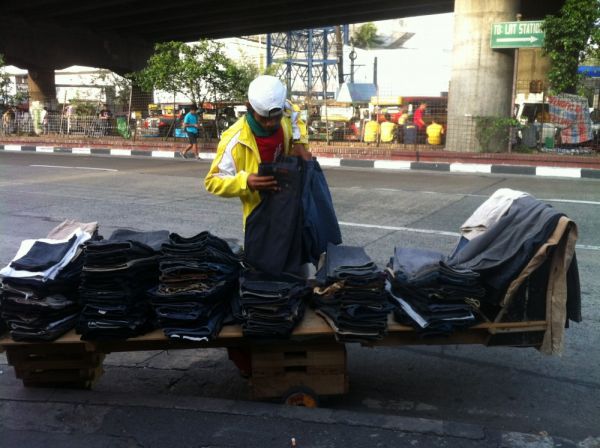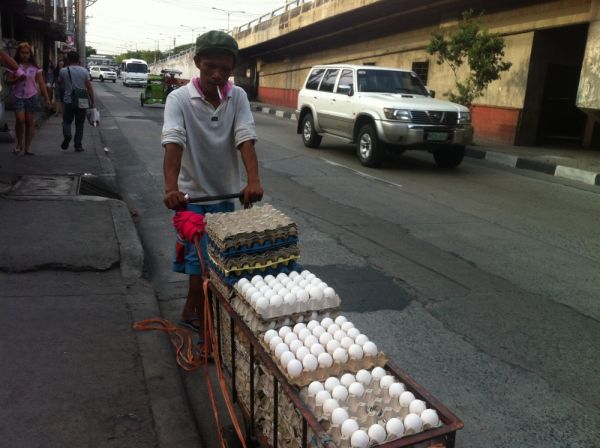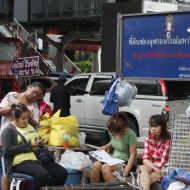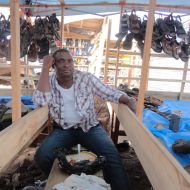Rolling Stores Keep Merchandise on the Move in an Ever-Changing City

Rex with his rolling store, piled with pants and shorts. Photo credit: Purple Romero
Rex Fajardo has the hands of a worker. His fingers are long, his palms wide, custom-built for carrying a large shovel and heavy loads. Its easy to imagine him working in a port, a basket of fish balanced on his broad shoulders, languidly walking the piers while the rest of the world rushes past in its busy pace.
In fact, Rex used to be a welder, getting paid $8 USD a day. But today, instead of a blowtorch, what’s in Rex’s hands is a tailor’s measuring tape. And instead of a stack of steel piping, he’s got piles of clothes in a cart that his aunt bought for $45. “I like it here,” he says of his street-side mobile shop. “There’s no boss.”
Rex sells clothes from a “rolling store,” a cart that he pilots almost every day from Riverbanks, Marikina, two kilometers to a corner near the train station in Katipunan in Quezon City, an area known for its mix of restaurants, coffee shops and student hangouts.
His spot is at the tail end of Katipunan’s long stretch, where construction workers huddle in half-built condominiums, and pedestrians and commuters hurry past to their daily destinations. The 25-year-old Rex dresses in a red shirt and yellow sweater, his cap turned backwards. He hardly ever smiles. Unlike the salesmen in the malls, he doesn’t engage the customers who sift through his clothes. He just stands and watches them, measures the waistline of their pants and shorts if need be, and puts purchased merchandise into plastic bags. In a soft voice, he sometimes calls out, “Shorts, shorts,” but most of the time he’s silent.
For Rex, a rolling store is an easy way to make some additional income. He and his aunt buy their clothes in Baclaran, a marketplace known for selling goods at cheap prices. For P9,000 ($225 USD) they can get 200 pairs of pants. His aunt taught him how to sew so he can repair damaged pants and shorts to make them look new. He can fix zippers and buttons, make them look as good as branded clothes.
They sell in the morning from a regular store in Marikina before piling whatever’s left over into the cart at 3 p.m. and wheeling away. The rolling store was his aunt’s idea. She realized they could get more customers outside of Riverbanks after seeing rolling stores with clothes in Aurora, Cubao, in nearby Katipunan.
Rex will sell on the streets until eight in the evening, hawking pants and shorts for 80 US cents apiece. He can sell 10 to 20 pairs in a day – for every $2.50 worth of items he sells, he pockets about 37 cents.
One of his regulars is Ver Manalo, a 35-year-old seller of herbal products. Dressed in light-blue jeans and a fashionable black v-neck, he says he’s bought two pairs of shorts from Rex’s cart already.
“I don’t mind if I can’t fit them,” he says. “They look nice and they’re really cheap.”

Reno propels his delicate merchandise through Manila. Photo credit: Purple Romero
There are three basic types of street vendors in Manila: Ambulant or sidewalk vendors, who place their goods on a mat and sell them from the sidewalk; the stall vendors, who pay for their own spot in the market; and the rolling store vendors who use carts to selling their products and keep mobile. (The city’s famous jolly jeeps could probably fit into this final category).
Rolling stores have existed in Manila since the days when they were pulled by carabao (water buffalo). Today they’re propelled by vendors on foot or motorcycles, selling everything from brooms to shoes to food. And corporations are starting to catch on, too. In March, the concept was used by Smart telecommunications, one of the biggest telco companies in the Philippines, which sent out rolling stores to sell mobile phones. Even the government has gotten in on the game – rolling stores were officially adopted by the Department of Labor and Employment (DOLE) in 2006. DOLE and the National Food Authority now deploy government-owned rolling stores that sell rice and other goods at low prices to make commodities affordable for the urban poor.
A few steps away from Rex is 44-year-old Reno Ayawen, with his own rolling store. Reno lives in Escopa village, also in Quezon City. Trays of eggs are stacked in his rusty, steel cart; he delivers these to about ten families in Loyola Heights, a subdivision in Katipunan where the upper-middle class lives in gated communities. Reno carefully navigates his cart to the other side of the street – he couldn’t have picked more fragile merchandise.
His regular customers are mostly mothers. He stops by their houses in the mornings and sells them eggs – a minimum of five, or as much as a tray of 30. He says he prefers to sell his eggs from a rolling store rather than a market because it’s cheaper; he pays 50 US cents a day for the cart, which he rents from the market. A stall in the market would cost him $175 a month, not to mention additional expenses for electricity and maintenance. He wakes up at 2 a.m. every day and goes to Blumentrit in Manila, where he picks up 48 trays of eggs, paying P4,000 ($100 USD) for them. He then sells them for $3 a tray, making a profit of about $25 a day, of which he gets to keep $8 — the rest goes to expenses. He has five kids, the eldest of which is 15 years old, whom he sends to school.
Like Rex, Reno used to be a manual laborer, but he gave up his job in construction after learning of the rolling-store job through a neighbor. Rolling stores are an important economic outlet for men like Reno, who at 44 years old can’t do the strenuous jobs he used to do, and has limited employment options at this stage in his life. And even if he could, Reno says he wouldn’t go back to construction work again because he earns about the same with his rolling store, but with less risk to life and limb. Still, even now, working in the road means the danger of being hit by a car is ever-present. Reno tells me his friend’s cart was mowed down by a car just last month.
“All of his eggs were broken,” he says, more concerned about the loss of merchandise, it seems. “That would have cost him $150, but the owner of the car gave him $25.”
Reno, small and thin, doesn’t mind if he doesn’t have any housing and health benefits. “I’m okay with this, as long as I can feed my family,” he says. But Rex doesn’t have a family. His aunt pays for his contribution to the social security system and also pays for his housing benefits. For him, the rolling store is his lifeline.
“I can’t think of anything else to do,” he says. “I didn’t finish college. What else is there for me?”









